Pros: Unique bed functionality; great on-road ride and handling; sophisticated standard all-wheel-drive system; more family friendly interior than other small trucks
Cons: Controversial design; shallow bed height; limited ground clearance; less family friendly interior than crossover SUVs
The 2024 Honda Ridgeline is quite obviously not a normal truck. It has more in common with car-based “utes” sold in Australia than the F-150s and Tacomas of this world. Once you accept that it’s OK to be different, and admittedly look a bit dweeby, the Ridgeline can make so much sense. Its under-bed trunk compartment never ceases to be useful. Its rear cabin’s flat floor and flip-up seat bottom grant it full-size truck versatility in a mid-size package. Its ride and handling are far superior to any “proper” truck.
We could go on, but basically, the Ridgeline can be considered an alternative to either midsize trucks or midsize crossover SUVs. To the latter group, we’re betting there’s quite a few people who’ll more frequently use the Ridgeline’s bed and underfloor trunk than the third row of a Honda Pilot, for instance. One of our editors brought a 5-foot-tall tree home using the Ridgeline bed/trunk – that was not happening in a Pilot. Now, there’s not as much backseat legroom present, so it’s admittedly less friendly from a passenger perspective. And, back to midsize trucks for a moment, you won’t be able to tow as much or go as far off-road.
So, the Ridgeline certainly won’t be for everyone, but it will always be uniquely appealing for those slotted within a particular niche.
Interior & Technology | Passenger & Cargo Space | Performance & Fuel Economy
What it's like to drive | Pricing & Trim Levels | Crash Ratings & Safety Features
What's new for 2024?
The big news is the new Ridgeline TrailSport, which adopts many of the same elements of the all-new Pilot TrailSport and the recently revealed updated Passport TrailSport. The suspension gets unique spring rates, damper valve tuning and stabilizer bars. The tires are General Grabber A/T Sports. Visually, the TrailSport gets a unique grille insert complete with Pewter Gray finishing, a color also on the special-to-TrailSport 18-inch wheels and lower fascia garnish. Below that is added steel underbody protection to go with unchanged ground clearance.
As for the rest of the lineup, every 2024 model gets RIDGELINE stamped across the tailgate, along with some notable interior changes. The instruments are new and the infotainment system is updated to a newer, quicker system with a 9-inch touchscreen and a little ledge added at the bottom to rest your hand while making inputs. The center console was also redesigned to expand the phone-holding tray and replace its minivan-like center bin and seat-mounted armrests with a smaller but more conventional bin and cantilevered armrest/cover.



What are the Ridgeline interior and in-car technology like?
The Ridgeline is based on the previous-generation Honda Pilot, and the interior from the B pillars forward clearly shows it. It was a boring design for a three-row family crossover, and it continues to be a real sad trombone for a pickup. Materials and build quality are at least very good for a pickup in this price range. There were changes made for 2024 (which were shared with the also-related Honda Passport), but they fall into the “functionality” folder instead of the “style” one.
Among those functional changes is the new center console. Technically, it’s a little less useful – you could fit a purse in its central bin before, but you can’t now. People didn’t like the old minivan-style armrests attached to the seats, though, so the more conventional center bin/armrest combo is sure to be more popular. The enlarged phone-holding tray for always-growing smartphones should be universally appreciated, along with wireless charging and a grippy surface.
Another improvement is the infotainment system, which finally gets a proper upgrade. It’s not quite Honda’s latest and greatest, but it has a bigger screen (9 inches), quicker responses and all-around better functionality. Is it still broadly behind the times? Sure, but it’s easy to use, and that’s the most important thing for many.


How big is the Ridgeline?
On the outside, the Ridgeline is basically the same length and height as other midsize crew cab pickups. Its wheelbase isn't quite as long, and it has less ground clearance (7.6 inches), but it's notably wider. However, the Ridgeline's unibody "crossover" construction means these similar dimensions on the outside do not translate into similar measurements inside. Simply put, the Ridgeline cabin is far roomier and more comfortable for passengers. You can see this most in terms of rear-seat legroom, and all that extra width results in a similar advantage in shoulder room. If you’re considering the Ridgeline as an alternative to large crossover SUVs like the Pilot or Passport, though, it’s worth noting that there is less rear-seat legroom and the seat does not recline.
In terms of storage, the Ridgeline’s back seat has a flat floor (much like full-size crew cab trucks and unlike the various midsize trucks), meaning it’s more useful for storing luggage and other items. The seat bottom also flips up in a 60/40-split arrangement meaning you can use it for people and their stuff. Better still, you can forget putting stuff in the cabin altogether. The Ridgeline has a 7.9 cubic-foot, water-tight trunk compartment under the bed that we found can hold three small suitcases or a whole lot of something else (you wouldn’t believe how many ice bags it takes to fill up).
The bed itself is available in only one size, 5-foot-4-inches, which is consistent with the short beds that typically come standard with midsize crew cab trucks (it's also much longer than the cargo areas of midsize SUVs). Its walls are much shorter in height, though. To access the bed as well as the trunk, the Ridgeline features the unique Dual Action tailgate that swings out in addition to dropping down. We found ourselves mostly swinging it as you can reach further into the bed – the drop-down function also isn’t damped. It should be in 2024.




What are the Ridgeline fuel economy and performance specs?
The Ridgeline sure keeps things simple by offering only one powertrain and drivetrain combination: a 3.5-liter V6 that sends 280 horsepower and 262 pound-feet of torque through a nine-speed automatic to a torque-vectoring all-wheel-drive system. You want rear-wheel drive? Too bad, the Ridgeline is based on a front-wheel-drive platform. You want front-wheel drive? No, of course you don't. You aren't alone, Honda discontinued that option with its 2021 refresh.
EPA-estimated fuel economy comes in at 18 miles per gallon city, 24 mpg highway and 21 mpg combined for most trim levels. The TrailSport returns 18/23/20. This is basically the same as other midsize trucks, if actually a smidge worse. An all-wheel-drive Honda Pilot is virtually identical, though.

What's the Ridgeline like to drive?
The Ridgeline has without a doubt the smoothest ride and best on-road handling of any midsize pickup. It even has a torque-vectoring all-wheel-drive system, which shunts power to each rear wheel to improve handling and traction. Basically, the Ridgeline drives more like a crossover than a body-on-frame truck – because that's exactly what it is. The ride is a little firmer than a Pilot or Passport's (especially with the TrailSport’s all-terrain tires), but every Ridgeline is a very civilized pickup to drive.
There are, of course, downsides. Its 7.6 inches of ground clearance isn't even high for a crossover, and while its all-wheel-drive system, off-road driving modes and HPD package upgrades make it surprisingly capable off the beaten path, it can't touch even the more basic versions of midsize trucks. Heck, even some crossovers have greater ground clearance and capability.
The same can be said of towing capacity, which tops out at a rather weak 5,000 pounds. Its payload of 1,583 pounds is at least comparable.
What other Honda Ridgeline reviews can I read?
2021 Honda Ridgeline First Drive
In our first drive of the revised 2021 Ridgeline, we dive more deeply into the changes and get a chance to drive it off road.

Honda Ridgeline Luggage Test
Find out how many bags fits in the Ridgeline's bed trunk as well as in its back seat.

2020 Honda Ridgeline Road Test
We actually use the Ridgeline for a good, old-fashioned truck activity: hauling mulch.

Long-Term Honda Ridgeline Test
We tested a Ridgeline for an entire year, and although there have been some updates since then, our impressions (and fondness for it) remain broadly the same.
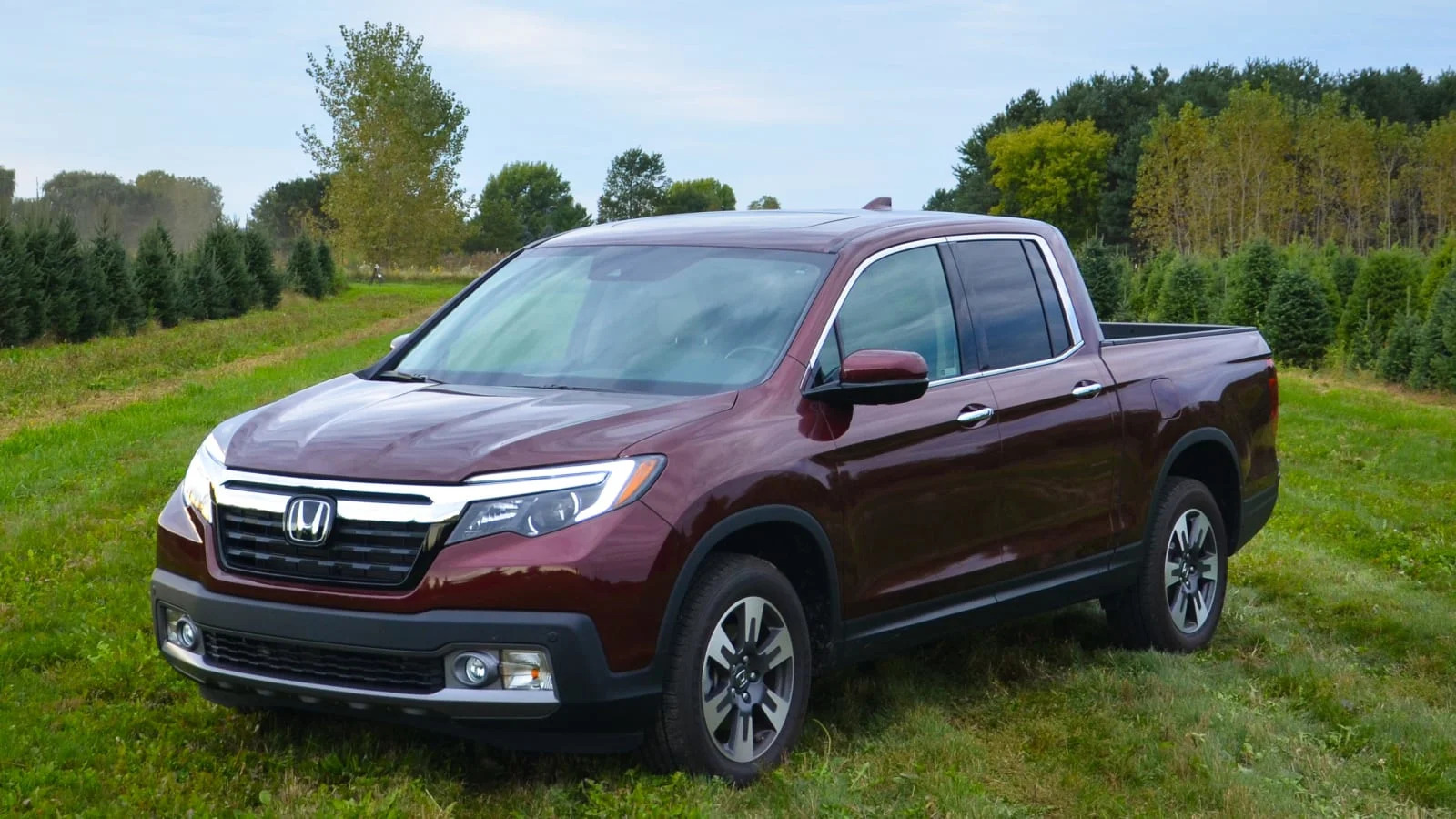
2018 Honda Ridgeline and Airstream Basecamp X | A match made in Michigan
We take our long-term Ridgeline on a long, cold weekend adventure with a mini Airstream
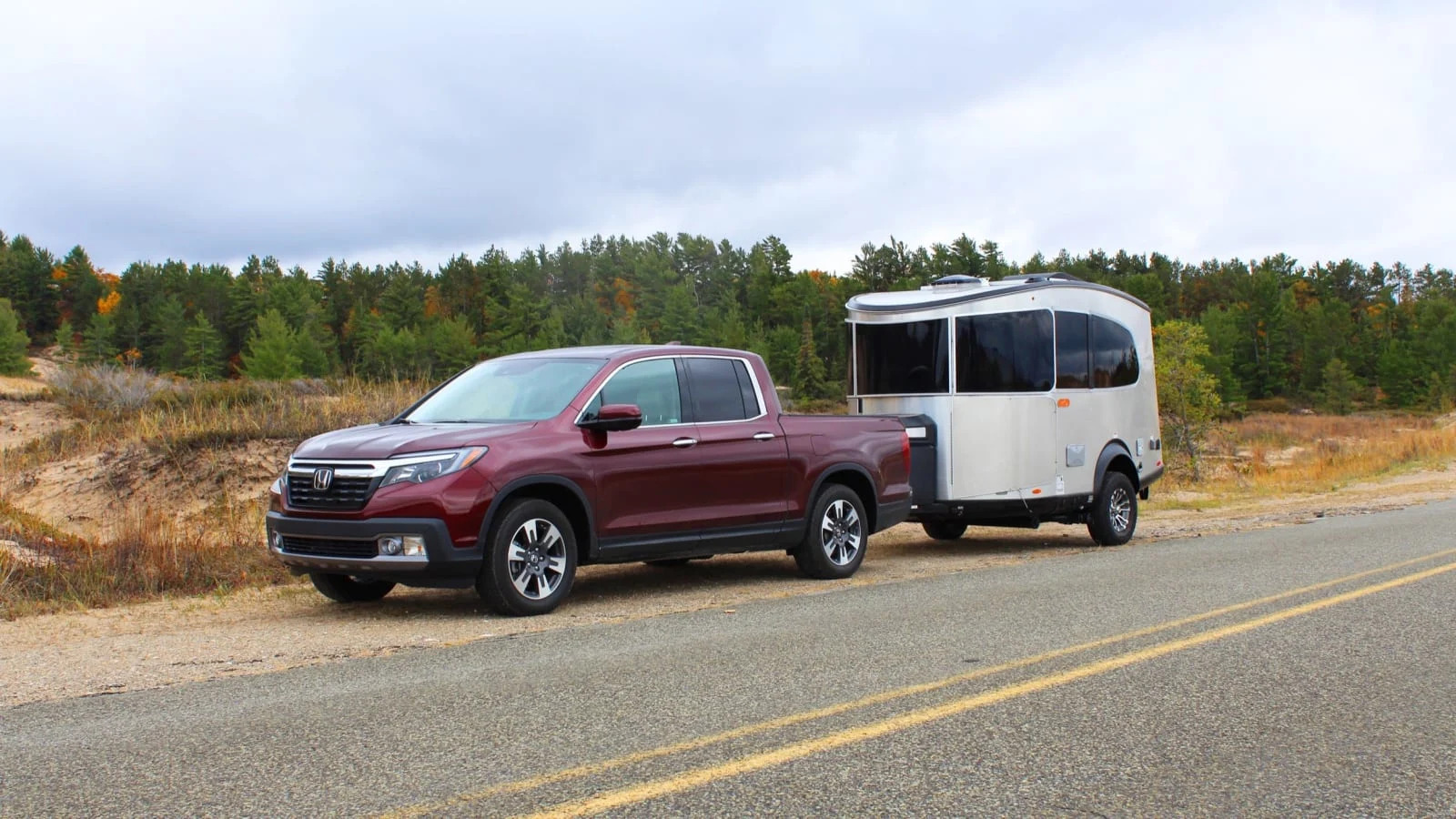
What is the 2024 Ridgeline price?
Pricing starts higher than the typical midsize truck, but then Honda doesn’t offer the sort of stripped-down work truck of various rivals. There are also much fewer trim levels than in the past, with all providing more than just an increase in equipment between them. In short, the Sport serves as the least-equipped base model, but has “sportier” darker trim compared to the next-up RTL that has more of a traditional Honda look with brightwork exterior trim. The Black Edition stands out with unique dark trim and red interior accents, but also has more and/or better equipment, including ventilated front seats, heated rear seats, a more powerful sound system, rear USB ports and a bed power outlet.
New-for-2024, the TrailSport is the most distinctive. In addition to unique gray exterior trim and wheels, it has all-terrain tires, underbody protection and a suspension with unique spring rates, damper valve tuning and stabilizer bar.
All prices below include the $1,395 destination charge.
Sport: $41,145
RTL: $43,975
TrailSport: $46,375
Black Edition: $47,745
What are the Ridgeline safety ratings and driver assistance features?
Every 2024 Ridgeline includes forward collision warning, automatic emergency braking, lane-keeping assistance, and adaptive cruise control with steering assistance. Blind-spot and rear cross-traffic warning are on all but the base Sport. Although it's commendable that these features are standard, they are some of the oldest and least sophisticated on the market. Adaptive cruise control tends to brake too much, accelerates back up to speed too slowly, and the steering assistance pales in comparison to that offered by other brands.
The National Highway Traffic Safety Administration gave the Ridgeline five out of five stars for overall, frontal and side crash protection. No other midsize truck can match this. The Insurance Institute for Highway Safety gave it the best-possible rating of "Good" in all crash tests but the newest small overlap front: passenger-side test where it got a second-best "Acceptable." The forward collision prevention system also got a rating of good, but the headlights got a third-best/second-worst score of "Marginal."
It also got an “Acceptable” rating for car seat installation and we can concur that it is difficult to do so (not unusual for a truck, but still). The top anchor setup is confusing and may not work with every child seat. Make sure to bring your car seat along on a test drive and, should you purchase, make sure to visit a fire station or some other accredited car seat fitment expert to ensure you’ve installed it correctly.
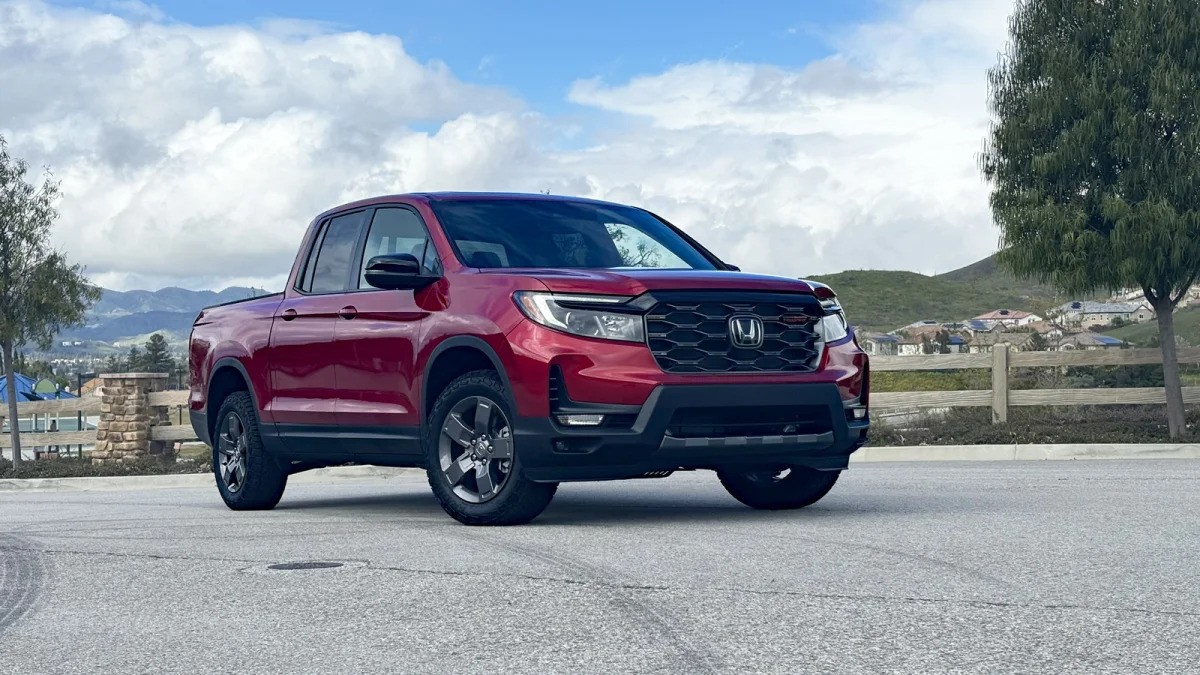

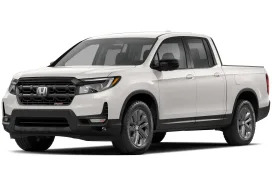
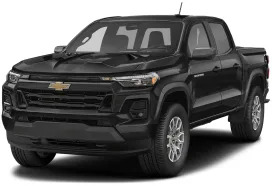
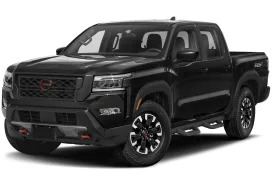









Sign in to post
Please sign in to leave a comment.
Continue